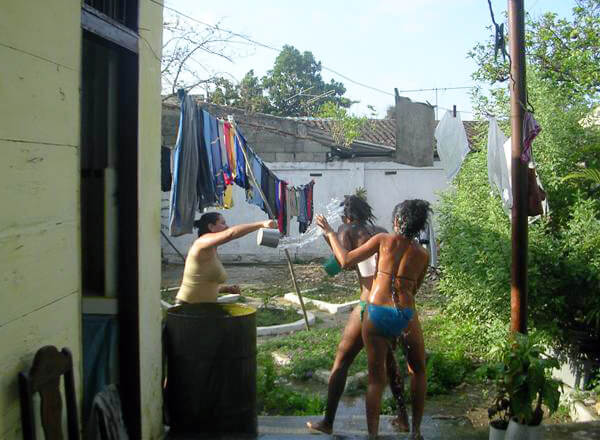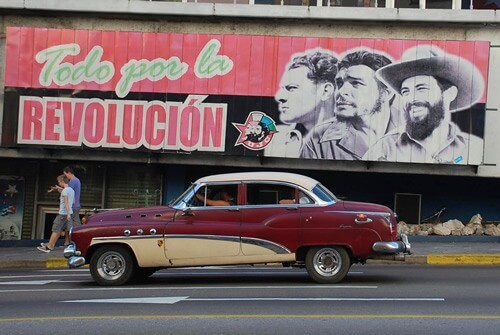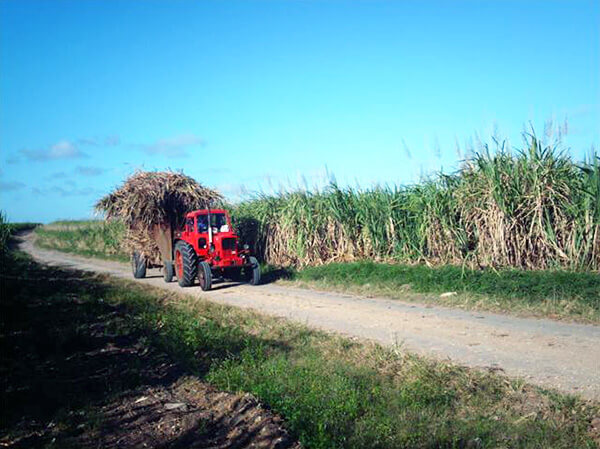|
¡Oye Niña!
A Transformation in Cuba
Article and photos by Seble Gameda
 |
| A water fight in the backyard. |
Whose Cuba? My Cuba. My three months in Camajuani shed all the misconceptions that poured over me before I stepped foot in the country. Crazy Communists. Poor souls can never leave the country. They would not have to worry about the embargo if they had become Capitalists.
Strong, Independent Cuba
When I arrived with a group of Canadian and Cuban youth, our first step was to get temporary citizenship cards. Yes, for three months, I would be a Cuban citizen and nothing else. I would live in a bright blue house on Independencia Boulevard with Edy, Marcos, Ismaray, Adrielis, and our German shepherd, Jony.
In the beginning, everyone thought I was Cuban. “No I’m Canadian,” I would respond. “No you’re not, there’re no Black people in Canada.” Initially, it made me mad, but soon, I could take it with a grain of salt.
I thought my Spanish would be passable in Camajuani. Still, it differed from the dropped letters or slang of the Cuban language.
Culture Shock in Cuba
With no phone in our house, the Internet blocked in our town, and post mail taking one month, my first week was tough, and I spent a lot of it angry. But I guess it is like that with everything new; it takes some getting used to because I came to appreciate the detachment I initially hated.
Hasta la victoria siempre. Si se puede. Revolución es independencia. There was no advertising anywhere, only official propaganda. The words of famous mambises and revolutionaries filled the streets, school grounds, and marketplaces.
 |
| An early 50's car passing a bill board featuring revolutionary heroes from the past. Photo by Lies Ouwerkerk. |
Vibrant Cuba
Cuba, for those three months, meant many things to me. It meant ration cards, arroz con frijoles, trips to the panadería, free health care for a sprained ankle, sugar cane, bicitaxis, cangrejito dulces, biking around the countryside on Marcos’ rugged bike, organoponicos, reggaeton, volunteering at the special needs school, trips to the outdated male dominant gym, domino games, and salsa dancing the likes of which you would not believe. It also meant learning from remarkable people. It meant discovering their generosity, desires, patriotism, and independence.
History: Learning from Cubans
Curious about the rich history of such a small island, I asked the Cubans to teach me what they knew. What I received was a very richly patriotic account. I wondered why that was the case, not feeling overly patriotic about my country. I realized that their patriotism exists due to an atrocious past that is still so ripe and vivid. Batista is still a living memory, not just a name in history books.
Daily Life in Cuba
My daily life as a Cuban was simple and satisfying. Traveling by word of mouth, we would line up at the Bodega (the state market) once the food had arrived, filling up our large bags with our rationed food; rice, sugar, yucca… whatever had arrived that day.
 |
| Havesting the sugar cane. |
Discovering the nooks and crannies of the small town was one of my favorite activities. El río, where we met Jose Luis Santerio del Rio, was a blessing. Every weekend, we would return to see him swimming in the river and hiking through the hills. Finding the houses that sold bananas and guavas when nobody else did or going on adventures to find the best duro frío added dimensions to the experience.
Hands down, my most exhilarating experience was the night of a Santería celebration. I had not felt so much fear and excitement all at once. Women were shaking as they danced, taken over by another force, knives being placed on children’s heads, twigs and leaves beating everywhere, and rum sprayed onto the onlooking crowd.
Camajuani, like all Cuban cities, was filled with organoponicos, urban organic farms that fed the city. Just down the street from our house, working up to 14 hours a day just for the love of it, was Sosa, the farmer and former revolutionary fighter — my 84-year-old friend. I would buy my vegetables from him even though you are not supposed to. I remember when I bought carrots. He pulled a carrot out of the ground, and I ate it. There was no packaging, no tag that said “From Guatemala,” the carrot had not spent hours in a 16-wheeler refrigerated truck. There were only a few seconds from his hand to mine. And I realized he knows the land; they know the land. But what do I know? What do I produce for myself?
During my three months in Camajuani, I learned much more than I contributed. What I admired most was their self-sufficiency. Cubans lived on a land that they understood. They were, therefore, able to cultivate and harvest it. That is what is really great and important about travel. You learn so much from the people and culture you are immersed in. You can take the wonderful things you have learned back to where you live and work on something you are genuinely passionate about. Travel is an opportunity to learn about yourself, as well. You discover who you are as a person. Withdrawn from your mindless daily routine, you can reflect on what you love.
Returning Home
Returning home motivated by what I had just experienced, I needed to immerse myself in all things environmental. In Camajuani, there was next to no waste. Everyone brought their own bags to pick up their food from the market. Leftover food was given to the pigs next door. The newspaper was used as toilet paper. Everything had a dual purpose.
Back in Montreal — inspired by the ingenuity and dedication I had witnessed in Camajuan — I began working with environmental justice groups, on rooftop gardens, and with organic farmers. I have now come together with a community of people who share similar beliefs, including “Meals on Wheels” programs, delivering fresh food to people who have lost their autonomy, caring for older people, and creating campaigns to initiate environmental awareness. All these activities and more have become crucial as I discover what interests me more. What I learned in Camajuani was not just something that I could scribble in a scrapbook; it propelled my desire to learn and travel even further.
I have become a bit defensive about my little town in Cuba. I have heard many critiques. But to me, their lives seem fair. No, they do not drive a shiny red Lamborghini or have memberships in exclusive golf clubs. But they have what they need. They have a roof over their heads, food, a functioning educational system, health care, and employment. Such a society seems in some ways superior to one where — on the same block — you can see corporate skyscrapers and homeless people sleeping in metro stops, incongruities that exist all over the so-called “developed” world.
I admired the autonomy of the Cubans, who were shunned by much of the world but survived nonetheless. They defy expectations and live their beliefs despite actions taken against them by the West. Kudos.
|
